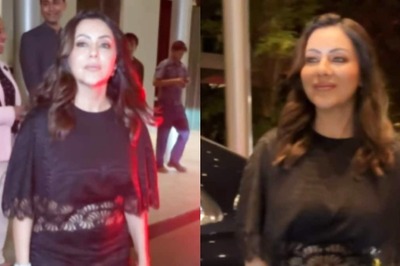
views
Social media companies such as Twitter, Facebook and Instagram “may become liable for criminal action” in India and lose their status as “intermediaries” that grant them certain exemptions if they do not comply with new rules notified by the government by May 26, official sources said on Monday.
They said the electronics and information and technology ministry notified the rules in the gazette on February 25 and asked social media companies to comply within three months. Except Indian company Koo — which has a user base of above 50 lakhs — significant social media intermediaries have not appointed grievance officers or nodal contact persons, as specified in the rules.
“These rules come into effect on May 26, 2021 (Wednesday). If social media companies do not obey the rules, they may lose their status and protections as intermediaries and may become liable for criminal action as per existing laws of India,” a government source said.
The rules, or the Information Technology (Intermediary Guidelines and Digital Media Ethics Code Rules), aim to make social media companies more accountable by way of self-regulation and empower users by bolstering the grievance redressal mechanism.
“Some of these platforms sought more time up to six months for furnishing compliance,” the source said, while citing what he called “non-cooperative attitude”.
In some cases, the “standard reply” from significant social media firms (user base of 50 lakhs and above) is that they will await instructions from their company headquarters in the USA, the source added. “They do business in India, earn good revenues, but grievance redressal will have to await instructions from the US. Some platforms, such as Twitter, keep their own fact-checkers whose names (are) neither made public nor is there any transparency as to how they are selected and what is their standing.”
These companies, “known as intermediaries”, enjoy certain exemptions from liabilities under Section 79 of the Information Technology Act “for any third-party information data etc. hosted by them”, the source explained.
“Though they claim the protection of being an intermediary, they exercise their discretion to also modify and adjudicate upon the content through their own norms without any reference to Indian Constitution and laws. One can appreciate fake posts or a post injuring the dignity of women or promoting terrorism etc., but to be judgmental on free expression of views by colouring them by a self-appointed norm is something that travel beyond the mandate of exemption, which they are doing,” the source said.
Officials say the evolution of social media firms suggest they are no longer limited to playing the role of intermediaries and often become publishers. They maintain the new rules are a fine blend of liberal touch with a self-regulatory framework, and work on the existing laws and statues of the country that are applicable in case of online or offline content.
What The New Rules Are:
• All significant social media intermediaries are required to appoint:
(a) a Chief Compliance Officer
(b) a Nodal Contact Person and
(c) a Resident Grievance Officer
They are to be employees residing in India. The rules also necessitate significant social media intermediaries to have a physical contact address in India published on its website or mobile application or both.
• Under the rules, intermediaries must prominently publish on website, mobile application or both
(a) the name and contact details of grievance officer and
(b) the complaint mechanism.
The grievance officer must acknowledge the complaint within 24 hours and dispose it of within 15 days and provide reasons to the complainant for any action/inaction.
• Significant social media intermediaries shall try to deploy technology-based measures, including automated tools, to identify information that depicts rape, child sexual abuse or conduct, or information that has previously been removed. The rules also require maintenance of appropriate human oversight, and periodic review of such automated tools.
• Significant social media intermediaries must publish a monthly report containing details of
(a) the complaints received
(b) action taken and
(c) number of links/ information removed or to which access is disabled, pursuant to any proactive monitoring by using automated tools or any other relevant information as may be specified.
• In case any objectionable information is removed by an intermediary on its own accord, following steps need to be taken:
(a) ensure that prior to the removal/ disabling access, the user who created, shared, uploaded such content is notified of such removal/ disabled access along with reasons
(b) provide adequate and reasonable opportunity to the user to dispute the action and request for reinstatement of such access and
(c) resident grievance officer to maintain appropriate oversight over the dispute resolution mechanism.
Read all the Latest News, Breaking News and Coronavirus News here. Follow us on Facebook, Twitter and Telegram.

















Comments
0 comment